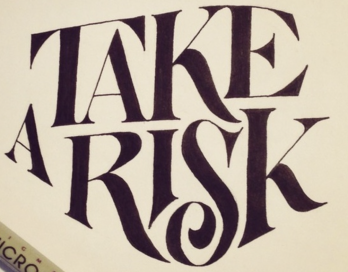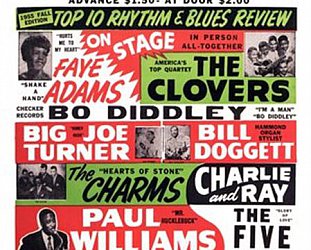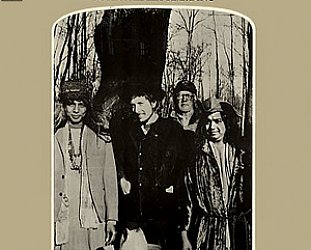Graham Reid | | 4 min read

A week or so ago over lunch, a couple of us were talking about the state of local music.
“There's just a lack of risk,” he said with obvious exasperation.
And that's something I'd been thinking about for a while.
We could blame Spotify and young pop artists' pursuit of scoring a breakout on one of the curated playlists. To achieve that you aren't going to do anything daring or risky because pop these days – and perhaps not since the Seventies -- isn't like that.
Where once a radio programmer preventing the genius of young musicians from getting their dues – at least that's who young musician would blame – these days your glittering career is in the hands of algorithms as much as employees scanning the 120,000 new tracks added every day.
Yes, every day.
That's around 43 million new tracks added by the end of this year.
Given the small likelihood of an artist's track breaking out – they'd have as much luck with a major Lotto win – you'd wonder why they don't just make music which is more risky.
Maybe they don't want to?
Spotify drives how artists make albums now too.
Where once – and this is still true in the world beyond chart pop, like in indie rock or with genuinely risk-taking artists like Billie Eilish, Angel Olsen, Julia Jacklin, Sharon Van Etten and others – bands or soloists released a single or two then an album.
That album may include those songs.
But very common now (Foley's Crowd Pleaser -- interesting title -- being a recent example) is that artists drip-feed their songs over a period of time on Spotify in the hope one or other will get uptake.
The idea is sound enough – it's like throwing it at the wall and seeing what sticks – and certainly it's a way of building a body of work.
 But let's not pretend that if an album comes out with 10 of the 12 songs having been available for weeks, if not many months, that this is a new album.
But let's not pretend that if an album comes out with 10 of the 12 songs having been available for weeks, if not many months, that this is a new album.
It's a compilation with two new songs.
We see it also where an artist releases half the album then follows it up some time later with the other half (like Lontalius), or maybe releases the album in thirds.
So, many in the pop field – and we reiterate, we are talking those aiming for widespread pop success – refine their sound into what is going to be the most acceptable to as many people.
Maybe that's sensible, but it really does make for some surprise-free albums as our singles and album charts have shown in the past few years.
The same people – or such similar sounding acts – getting all the attention with small skyrockets of others appearing and disappearing within a fortnight. To these ears those rockets have usually been the most interesting.
There are pathways to follow – we seemed to have reached peak post-Aldous and her acolytes – and some are more successful at it than others.
Maybe it's smart to adopt the templates of Six60, LAB and Drax Project? Or at least identify their audience and aim directly at it?
 Maybe, but it makes for risk-free music which neither challenges or entertains.
Maybe, but it makes for risk-free music which neither challenges or entertains.
And given the poor returns from streaming services you might as well just do exactly what you want, like the indie artists.
Summer Thieves emerged from Ōtepoti Dunedin's student party scene like Six60, have toured with Loop labelmates LAB and are their enormously popular offspring, appealing to the same demographic with a guarantee of fitness for purpose.
For the recent Going Global Music Summit in Auckland showcasing 21 local artists, Summer Thieves were described as “alternative, surf rock”.
The evidence of their third album Cigarettes in Space shows they far from being “alternative”.
 They are firmly in the mainstream of that laidback sound – with just enough reggae, funk and languidly stoned rap along the lines of lukewarm Arrested Development or De La Soul – which summer festival audiences soak up.
They are firmly in the mainstream of that laidback sound – with just enough reggae, funk and languidly stoned rap along the lines of lukewarm Arrested Development or De La Soul – which summer festival audiences soak up.
As for “surf rock”, nothing on Cigarettes in Space approaches “rock” as most understand it, although there's a gestural bromide on Pieces: “Now that you're gone I wrote these lyrics on my phone . . . I still remember us talking about the Rolling Stones”.
It has none of the convincing ache of Big Star's Thirteen although Summer Thieves' songs are soaked in such heartache and reflection.
Singer Jake Barton – who often sounds in need of, or wanting to give, a hug – has a default position of yearning and calculated soulfulness announcing sincerity, ennui and regret over lost times and love, themes holding special appeal for late teens/early 20s who acutely feel their youth passing too quickly: “As the years go by I know, I won't forget the times . . .”
Here too are “time keeps tickin' away” on Sunshine; memories of “smoking cigarettes” and “a break from the fast lane” on Bali Nights; “sometimes you just can't do what you want to do but you need to” (Highway); “slow it down my darling” (Slow Down) and “as we grow older” (Always Know You which closes the album with the sound of waves).
This all sounds like a collection of songs which a focus group determined would be the most acceptable to a specifically targeted demographic.
Let's be clear, the album is intelligently produced and played.
But it is populist, unchallenging and – like the Rolling Stones' new single Angry – it is risk-free.
Needless to say it entered the local charts at number three.
.
You can hear and buy Summer Thieves' album at bandcamp here





post a comment